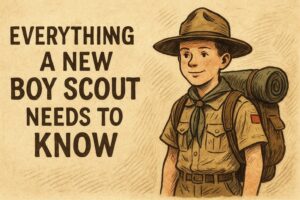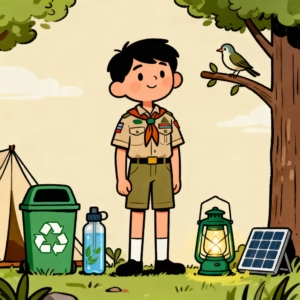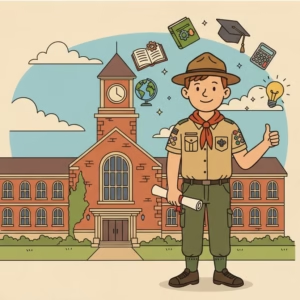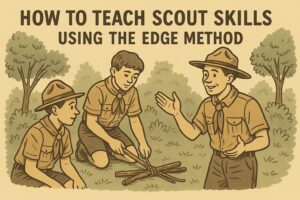Joining Boy Scouts is an exciting time for many people. Boy Scouts brings a whole new world of adventure, learning, friendships and a seemly daunting amount of things to memorize. Scouts are expected to the Scout Oath, Law, Slogan, and Motto as well as the Outdoor Code and principles of Leave No Trace all from memory. While learning all theses things can seem like an impossible task, I promise it is not as bad as it seems. The principles contained each of the above listed items will apply to your entire life and are sure to have a positive impact on your life.
In this article I’ll tell you everything you should memorize as a new Scout as well as give you a few ideas about how you can apply each of these principles in your lives. If need some proof that these ideas are the real deal, my dad, who earned his Eagle Scout in 1985, can still repeat the Scout Oath, Law, Motta and Slogan with ease!
Scout Oath/Law
These two sayings are the founding principles of Scouting. You will probably repeat them at the start of each Troop meetings and hopefully they will instill themselves into your identity.
Scout Law
A scout is trustworthy, loyal, helpful, friendly, courteous, kind, obedient, cheerful, thrifty, brave, clean and reverent.
These 12 little words create an extremely powerful message and set high standards for each and every one of us. Imagine what the world would be like if everyone followed even some of the points of the Scout Law in their day to day lives. By doing your best to live by each point of the Scout Law, you will become a better friend, Scout, citizen and person overall.
Scout Oath
On my Honor, I will do my best
To do my duty to duty God and my country and to obey the Scout Law;
To help other people at all times;
To keep my self physically strong, mentally awake and morally straight.
The Scout Oath is another short but powerful message. It outlines the 3 main promises and duties that Scouts hold; those being :
- Duty to God and Country
- Duty to Others
- Duty to Self
Each of these 3 duties are separated by semicolons in the oath and are all equally important. You’ll learn more about how each of these duties apply to you as you progress along on your Scouting journey.
Scout Motto/Slogan
These two axioms of Scouting are lesser known but still just as important. There are a total of 7 words between the both of them but they still carry messages that can be applied to one’s entire lie
Scout Motto
Be Prepared
These two basic words are both so simple and yet can be applied so widely. Being prepared can be thought of as more of a mindset that physical condition. There are many different ways you can be prepared. When the founder of Scouting, Lord Baden-Powell was naturally asked “Prepared for what,” he responded “Why for any old thing.” Baden-Powell wanted each and every young man to prepare themselves to be productive and impactful members of society. One quote about being prepared from him really sticks out to me.
“You are always in a state of readiness in mind and body to do your duty.”
Lord Baden-Powell
The motto Be prepared is so important that they are the only words listed on the Eagle Scout award.
Scout Motto
Do a good turn daily!
This simple little saying carries the power to make a huge change in the world. By simply doing one nice thing for another person each day, you start a chain of positivity and motivate that person do a nice thing for another person. A good turn could be anything from holding the door for someone, giving a smile to someone who looks down or complimenting someone on their outfit.
Scout Sign, Salute and Handshake
Scouts should also know the Scout Sign, Salute and Handshake. These signs are used to greet other Scouts, show that your are a member of the BSA and show respect in official ceremonies.
Scout Sign
The Scout Sign is used whenever you giving the Scout Oath or Law. To do the Scout Sign, you raise your right arm to shoulder height and then bend your elbow making a 90 degree angle. With your hand upwards, cover the nail of your pinkie and keep the other 3 fingers upwards.
The 3 fingers of the Scout Sign represent the duties listed in the Scout Oath: Duty to God and Country, Duty to Others, and Duty to Self.
Scout Salute
The Scout Salute is done by forming the Scout Sign and then placing your pointer finger against your brow. The Scout Salute is used whenever you say the pledge of allegiance in Scouting or during official ceremonies like a flag retirement. The Scout Salute should only ever been while in your Class A uniform. Anytime you would do the Scout Salute and are not in your Class A, simply place your right hand over your heart
Scout Handshake
The Scout Handshake is the same as a normal handshake except it is done with the left hand instead of the right. This is done because the left hand is closest to the heart and it signifies the connection and friendship between Scouts.
Because only Scouts use the left handed handshake, use a normal handshake when greeting someone not in Scouts.

Outdoor Code/Leave No Trace
Spending time outdoors is a core part of Scouting. Our treatment of nature is important to make sure that we preserve it for the next generation. In order to keep nature pristine for future generations, the Outdoor Code and Leave No Trace principles were created. Both of these ideas have been adopted by Scouting and govern our behavior as Scouts in nature.
Outdoor Code
As an American, I will do my best to –
Be clean in my outdoor manners.
Be careful with fire.
Be considerate in the outdoors.
Be conservation minded.
The Outdoor Code as first released by the BSA is in 1954. Since then, it has undergone a few revisions but the same core principles remain. It calls us to take good care of the environment and keep nature clean. Think about how each of the principles can be applied in your Scouting life. More information about the Outdoor Code can be found here.
Leave No Trace
There are 7 principles of Leave No Trace.
1. Plan Ahead and Prepare
2. Travel and Camp on Durable Surfaces
3. Dispose of Waste Properly
4. Leave What You Find
5. Minimize Campfire Impacts
6. Respect Wildlife
7. Be Considerate of Other Visitors
Each of these principles cover a different aspect of conservation and wildlife protection. A common saying that I feel best applies the ideals of Leave No Trace is “Take only pictures, leave only footsteps.” It is our duty to protect the outdoors for other people and ensure the health of our planet
Conlusion
Scouting is an amazing program that has the opportunity to change your life! These 6 tenets of Scouting are the foundation for everything you will learn in Scouting. By memorizing them, you will be able to apply them to each situation you come across in both Scouting and your everyday life. I wish you the best on your path to eagle and happy Scouting!




